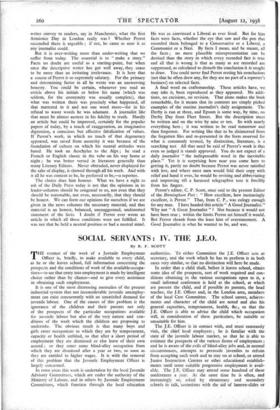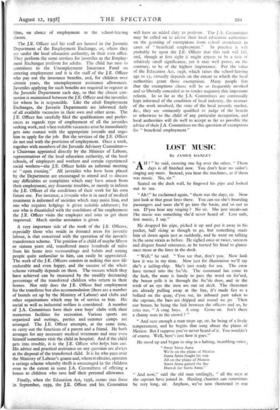SOCIAL SERVANTS : IV. THE J.E.O.
By R. F. SCOTT
THE essence of the work of a Juvenile Employment Officer is, briefly, to make available to every child, as he or she leaves school, full information concerning the prospects and the conditions of work of the available occupa- tions—to see that entry into employment is made by intelligent choice rather than by chance—and to give every assistance in obtaining such employment.
It is one of the most distressing anomalies of the present industrial system that not inconsiderable juvenile unemploy- ment can exist concurrently with an unsatisfied demand for juvenile labour. One of the causes of this problem is the ignorance of the children and their parents not only of the prospects of the particular occupations available for juvenile labour but also of the very nature and con- ditions of the work which the children are proposing to undertake. The obvious result is that many boys and girls enter occupations to which they are by temperament, capacity or health unfitted, so that after a short period of employment they are dismissed or else leave of their own accord ; or they enter some blind-alley occupation from which they are dismissed after a year or two, so soon as they are entitled to higher wages. It is with the removal of this problem that the Juvenile Employment Officer is largely concerned.
In some areas this work is undertaken by the local Juvenile Advisory Committees, which are under the authority of the Ministry of Labour, and in others by Juvenile Employment Committees, which function through the local. education authorities.. To either Committee the J.E. Officer acts as secretary, and the work which he has to perform is in both cases very similar, so that no distinction will here be made.
In order that a child shall, before it leaves school, obtain sonie idea of the prospects, sort of work required and con- ditions obtaining in the various occupations open to it, a small informal conference is held at the school, at which are present the child, and if possible its parents, the head teacher, the J.E. Officer and, in the London area, members of the local Care Committee. The school career, achieve- ments and character of the child are noted and also his general capacities, temperament, health, &c., so that the J.E. Officer is able to advise the child which occupation will, in consideration of these particulars, be suitable or unsuitable for him.
The J.E. Officer is in contact with, and must constantly visit, the chief local employers ; he is familiar with the state of the juvenile labour market, so that he is able to estimate the prospects of the various forms of employment ; and he is aware, of the evils of blind-alley jobs and, in normal circumstances, . attempts to persuade juveniles to refrain from accepting such work and to stay on at school, or attend Junior Instruction Centres or other educational establish- ments until some suitable progressive employment is avail- able. The J.E. Officer may attend some hundred of these conferences a year. At the same time he is often, and increasingly so, asked by elementary and secondary schOols to talk, "son'tetithes with the aid of lantern-slides or' films, on choice of employment to the school-leaving classes.
The J.E. Officer and his staff are housed in the Juvenile Department of the Employment Exchange, or, where they are under the local education authority, in their own office. They perform the same services for juveniles as the Employ- ment Exchanges perform for adults. The child has now to contribute to the Unemployment Insurance . Fund on entering employment and it is the staff of the J.E. Officer who pay out the insurance benefits, and, for children over sixteen years, the unemployment assistance allowances. Juveniles applying for such benefits are required to register at the Juvenile Department each day, so that the closest con- nexion is maintained between the J.E. Officer and the juveniles for whom he is responsible. Like the adult Employment Exchanges, the Juvenile Departments are informed daily of all available vacancies in their own and other areas. The J.E. Officer has carefully filed the qualifications and prefer- ences as regards type of employment of all the juveniles seeking work, and when suitable vacancies arise he immediately gets into contact with the appropriate juvenile and urges him to apply for the job. But the services of the J.E. Officer do not end with the provision of employment. Once a week, together with members of the Juvenile Advisory Committee— a Chairman appointed directly by the Minister of Labour, representatives of the local education authority, of the local schools, of employers and workers and certain experienced social workers—the J.E. Officer holds an informal meeting or " open evening." All juveniles who have been placed by the Department are encouraged to attend and to discuss any difficulties or complaints which may have arisen from their employment, any domestic troubles, or merely to inform the J.E. Officer of the conditions of their work for his own future use. For instance, a juvenile who is in need of medical treatment is informed of societies which may assist him, and one who requires lodgings is given suitable addresses ; for one who is dissatisfied with the conditions of his employment the J.E. Officer visits the employer and tries to get them improved. Much similar assistance is given.
A very important side of the work of the J.E. Officers, especially those who reside in demand areas for juvenile labour, is that concerned with the operation of the juvenile transference scheme. The position of a child of maybe fifteen or sixteen years old, transferred many hundreds of miles from his hOme into surroundings and habits and among people quite unfamiliar to him, can easily be appreciated. The work of the J.E. Officers consists in making this new life endurable and even happy, and the success of the whole scheme virtually depends on them. The success which they have achieved can be measured by the sfradily decreasing percentage of the transferred children who return to their homes. Not only does the J.E. Officer find employment for the transferee but also accommodation (there are a number of hostels set up by the Ministry of Labour) and clubs and other organisations which' may be of service to him. His social as well as industrial welfare is considered: A- number of J.A. Committees have their own boys' clubs with their numerous facilities for recreation. Various sports are organised and outings, parties and summer camps are arranged. The J.E. Officer attempts, at the same time, to carry out the functions of a parent and a friend. He both arranges for any necessary medical treatment and may even himself sometimes visit the child in hospital. And if the child gets into trouble, it is the J.E. Officer who helps him out. His advice and practical assistance on any question are always at the disposal of the transferred child. It is he who pays over the Ministry of Labour's grants and, where it obtains, operates a savings scheme whereby thrift is encouraged in the children even to the extent in some J.A. Committees of offering a bonus to children who save half their personal allowance.
Finally, when the Education Act, 1936,, comes into. force in September, 1939, the J.E. Officer, and his,. Committee will have an added duty to perform. The J.A. Committees may be called on to advise their local education authorities on the granting of exemptions from school attendance in cases of " beneficial employment." In practice it will probably be upon the J.E. Officer that this task will fall, and, though at first sight it might appear to be a task of relatively small significance, yet it may well prove, on the contrary, to be of the highest importance. For the value of the Education Act, 1936, which raises the school-leaving age to 15, virtually depends on the extent to which the local authorities grant these exemptions. Many people fear that the exemptions clause will be so frequently invoked and so liberally conceded as to render nugatory this important reform. In so far as the J.A. Committees are continually kept informed of the condition of local industry, the manner of the work involved, the state of the local juvenile market, &c., they are eminently qualified to judge of the benefit or otherwise to the child of any particular occupation, and local authorities will do well to accept as far as possible the advice of their J.A. Committees on this question of exemptions for " beneficial employment."







































 Previous page
Previous page